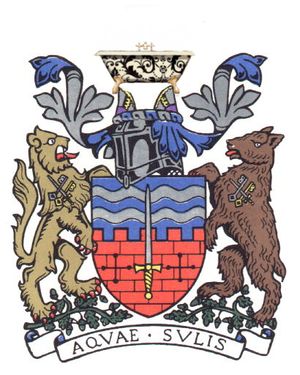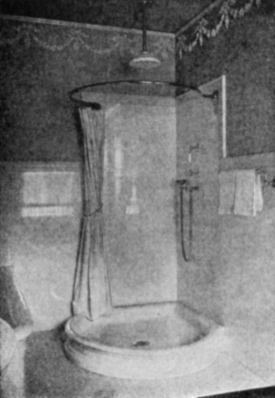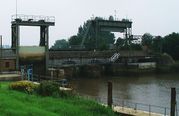Bath, Somerset
| Bath | |
|---|---|
| City | |
| Nickname(s): Aquae WestLondoniensis | |
| Motto: Sic Semper Fiducius | |
| Civic anthem: "Give us all your money" | |
| Official language(s) | American, Chinese, Chav, Pigeon, English |
| Government | |
| Mayor | The Right Worshipful The Mayor of Bath Sharon "Sex Drive" Ball, Mrs. |
| Established | 72 AD, by Gaius Germanicus Augustulus Britannicus Drusus Tiberius Vespasianus, son of Gaius Caesar Julianus Britannicus Drusus Tiberius Vespasianus, Emperor of Rome. |
| Currency | Dong or Bong |
| Opening hours | 8:30 - 23.00 (10:00 to 17:30 on Sundays) |
Bath (pron.: /ˈbɑːθ/ or /ˈbæθ/) is an historic quarry on the River Avon in South West England.
History[edit | edit source]
Early history[edit | edit source]
The city of Bath was discovered by the obscure Roman emperor Catus or, as he is more usually known, Gaius Germanicus Augustulus Britannicus Drusus Tiberius Vespasianus KG,GmbH & Co. On a trip from Londisium (a provisioning site in the Cotswolds) to Tesconium (a garrison town near Antirrhinum), he paused for a break on what is now the A46. Seeing the immense possibilities of the site spread out before him, lying as it does at an inconvenient distance from anywhere else in an awkward bend of the River Avon, with a choice between a flooded valley and vertiginous cliffs to escape Southwards.
The Romans built a number of structures in the Bath area, most famously the Thermae, or Museum of Thermos Flasks. Various legions were posted there at different times and amused themselves in the usual manner of Roman legions on uninteresting postings viz. engraving graffiti on walls, drinking, rape and pillage. When the Roman Empire collapsed in the area and the Dark Ages began, the small and wiry natives began to recolonise the area, looting Roman remains to stock their antique shops which persist to the present day.
The famous ordure repositories in the vicinity of Charlotte Street date from this period, as does the statue of Minerva Micturensis, the tutelary deity of Bath, and the temple of Jupiter Futuens, on the site of what is now the Abbey National Building Society, or "Abbey" as it is known to the locals.
Other famous structures include The King of Wessex Wetherspoon's Public House, the DSS Office 'Block' and the grand bus depot which is now known as Weston locks.
The site is now marked by the Circus (an affordable housing estate, assuming your definition of affordable to have been written for you by the Kensington and Chelsea office of Foxtons). The exact site is the one where the most annoying of all the annoying tour buses stops while the out-of-work actor on top lists all the famous people who might have lived in/walked through the area, and the Japanese tourists look hopefully for a bedroom with open curtains where some people might be having sex, or, if they are really kinky, watching daytime television.
The Dark Ages[edit | edit source]
During the Dark Ages (ca 420AD-1630AD) very little happened. From about 900BC onwards Bath was overshadowed by its much larger neighbour Frome, whose empire numbered nearly seven thousand inhabitants. From this period dates the intense rivalry between the two towns. Archaeologists for Bath have discovered the foundations of what appear to be huge wooden catapults or mangonels guarding the approaches along the A36, but other archaeologists from more respectable universities believe these to be the post holes for a primitive road toll post where the dues on wool would have been collected.
Civil War[edit | edit source]
During the Civil War Bath was famous only for a battle in which the cowardly Roundheads stayed hidden and fired lots of muskets while the heroic Cavaliers rode up hill towards them on very large horses, getting shot in the process. Eventually the Roundheads lost interest and went home, so despite losing most of their officers and a lot of their soldiers, the Cavaliers claimed a victory. This is an example of how the truth can, in fact, be stupider than fiction.
Uncivil War[edit | edit source]
During the 18th Century Bath began a period of ruthless expansionism. The long war with the Froman Empire to the South did not prevent expansion to the North and West, including an attempt to take over the city of Clifton by extending the A4. At the end of the 18th Century Bath was victorious on both these fronts due both to great military strategy and the boredom of their opponents.
20th Century[edit | edit source]
Bath did not escape the general upheavals of the 20th Century. It became the principal base for Naval spying, on the basis that first the Germans and then the Russians were expected to start an invasion of Britain by a naval assault on the Kennet and Avon Canal, followed by a drive for London. In an attempt to frustrate these plans, the river was blocked at Pulteney Weir and a series of gates were built between the Avon and the top of Bath.
Signs to tourist attractions such as the Museum of Knockers were produced in first German and then Russian. This was a cunning trap. The museum was in fact a labyrinthine and subterranean gift shop from which nobody would ever escape. The invasion never took place, and Bath eventually became a Western suburb of London, slightly further out on the Central Line than Ealing Broadway. This all changed, however, when the rising Communist party under their charismatic leader Pat Ten, first took over the Council and then successfully invaded Hong Kong (recaptured by the Chinese in 1997 with the support of the Gurkhas, led into battle by Prince Charles. This is the last time that an organic gardener has personally led a mercenary army into battle.) Following the Kulchural Revolution (in which the University was built and farm labourers, dustmen and manual workers were cruelly forced to work as lecturers in Women's Studies, Media Studies and Deconstructivist Sociolinguistics) Bath was renamed BANES (Bull And No End of Shit) and became a secretive dictatorship, with the support of its nuclear armed banana republic to the South, North Frome.
Today all that is known of Bath is that its people are starving while all its income goes into the production of vast palaces for the "Revolutionary leaders" [1]. The only permitted cultural events are mass demonstrations at which State employees engage in ritual warfare while the population is required to applaud enthusiastically. These are referred to in the local dialect as "rug ger" and "kri kit", which translate loosely as "Big oik kick oik" and "oik throw ball".
Update (May 2007, Month 4, Tenth Year of Pat Ten's Long March) A failed underground nuclear test is believed to have left much of central Bath in ruins, especially around the People's Bus Station. Visitors are advised not to notice the destruction as otherwise they may be led off for a period of "People's re-education" in the Museum Of Posterior Analytics (reported to be very painful indeed.)
Helphire Group 1992 saw the introduction to the local area of the great money grabbing slug of a company named Helphire. This company grew and grew and reached its peak in 2006-2007 just before it started eating itself. The slug was just too big to deal with its own gastrointestinal defects and thus hundreds of lovely people, and thousands of other c***s were laid off in its move up north in 2010.
The company was best known for its sponsorship of Bath Rugby and its failure to do any real business. The business plan was found to be flawed when it realised noone gave a f*** who they were and that people did in fact know they were being ripped off. A chapter closed.
Tourism[edit | edit source]
The State Tourism Agency organises conducted tours for Japanese and American visitors, in which every aspect of the tour is tightly controlled by plain-clothes agents of the State Police ("Buskers"). Frequently disguised as statues, these are easily identified by the small pile of bribes at their feet.
Racing[edit | edit source]
Betting on horses is permitted at the race-track north of the city. Each race has only two horses. To avoid giving offence to the locals, tourists are advised to bet their money on the bob-tailed nag, as nobody bets on the bay. Tourists are also advised not to draw attention to the fact that the bay always wins. For the more 'experienced' gambler, tourists may also bet on the outcome of chav racing, which involves 3 or more chavs racing their chavmobiles up and down Broad street.
Restaurants[edit | edit source]
At Claverton, somewhat South of the city, you can visit the famous restaurant where you can select the dog of your choice in the afternoon and have it for dinner the same evening.
Money[edit | edit source]
Visitors are each required to exchange $500 for the local currency (the Dong or Bong) which cannot be reconverted and cannot be taken out of the country. The only places that Dongs (or Bongs) can be spent are the race-track, the Claverton Dog Bar, flea-ridden "Guesthouses" of the State Tourism Agency, the local antique shops, or (and this is a very long shot for the desperate) the brothels operated by the Ministry of Financial Relationships and staffed entirelyasdfghjkl;dfghjkl by middle-aged women with back problems.
Entry restrictions[edit | edit source]
Visitors from the UK are not permitted as BANES does not recognise the right of the rest of the island to exist as an independent State. The inhabitants are, however, allowed to send money and food parcels to their relatives. If the source looks like drying up, the BANES authorities will force feed anyone with relatives "abroad" with so-called "Bath Buns" until aid is forthcoming. Amnesty International has written several postcards complaining about this form of torture.
Visa requirements[edit | edit source]
Entry to Bath is either by the Port of Bath (tourists often recall their first sight of the city from under the machine guns of the State Advisory Service in Sidney Gardens). Alternatively, try the A46, where customs formalities can take up as little as eight hours. These are quickly whiled away as your children are entertained by the pit bull terriers of the Citizen's Help and Volunteer Society (CHAVS) Visas are obtained from the BANES Consulate in Outer Fencepost, Ohio, from the Consular Attache in Yokohama, or from the Third Secretary, Tourism and Nuclear Weapons Development, BANES Embassy, Revolution Boulevard, Off Bath Road, North Frome.
Medical[edit | edit source]
Yellow fever, smallpox and anthrax viruses can be purchased at any State Registered People's Pharmacist for export only, on presentation of a tourist visa. Unfortunately, the HIV vaccine has not yet been invented. So watch your arses as the community is rife with Welshmen.
Souvenirs[edit | edit source]
Many visitors take away with them a typical hand-carved sculpture made from local materials - uranium 235 and plutonium 239 are available, though nowadays only for hard currency (i.e; Euros not dollars.) Cheaper, and available in exchange for dollars, is the local drink, "spasibo", made from grapes grown on the polonium-laden hillsides above the People's Nuclear Waste Reserve, and which is famous for the warm glow it gives to drinkers. Many tourists enjoy test-driving the 'motors' in the local brothel. The brothel also sells souvenirs for very reasonable rates, these souvenirs ranging from HIV to fully blown AIDS.
Twerton[edit | edit source]
Twerton, often known as Twat Town, is the largest sub-urban area of Bath. Not to be confused with other suburbs like Bathwick, Lansdown and Upper Weston, Twat Town is truly the anti-Bath district. Connected to Bath by factories, sewers and the worst, student accommodation, the district is a home for around 40,000 orphans, single mothers and drug addicts.
Bristolians often visit Bath via Twerton due to the unfortunate location of the A36 and the Not So Great Western Railway. Bristolians were rumoured to have started the district back in 1946 after the bombings of Bristol in WW2. Seen as the perfect opportunity to offload some cretins, the local council decided to create a complete shithole away from Bristol, hidden by the hills north-west of Newton St Loe, but far enough away from the centre of Bath so not to district the 4 billion tourists that they are assured visit the Roman Spunk Baths every year.
Twerton is also home to the creation of the number 5. The bus service has been assigned this number in memory.
Twerrrrton (as pronounced by locals) is a collection of failed marriages, old people, and the invention of Leonardo DiCaprio's crap acting school. It's not all bad though, there is the mighty Bath City FC who have won seven European Cups (all within 1980-1990) and who were going to take their place in the Premier League in 1992 but refused on religious grounds.
Town twinning[edit | edit source]
Bath is twinned with Pyongyang, East Belfast and Washington DC. It was at one time twinned with Hanoi, but the Vietnamese ended the arrangement on ethical grounds.
Commuter Villages[edit | edit source]
The towns of Midsomer Norton, Radstock and neighbouring villages such as Paulton, Westfield and Chilcompton all within a 12 mile radius are a hotbed for Chavs and other under class people. They seem to be the main supplier of chavs in Somerset and and other anti-socials for the City of Bath. Plans to bulldoze the population of chavs were rejected by the council "Cause its too much botha' innit; ai aint spendin' ma monkeys ta merc me bruvs, ye?". A MP was recently stabbed in a fray about I quote "Nabbin' my DVDs from me boss's shop". Chilcompton has the largest population of BNP and EDL supporters.




